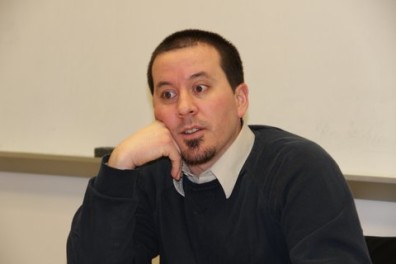Establishing the new environmental sociology at WSU

An exciting new group of sociologists at WSU are taking a diverse approach to studying the environment, covering an array of topics related to environmental inequality, concern, and behavior. These scholars are breaking new ground in the field, while drawing upon the historical legacy of environmental sociology at WSU.
“Although we all have a foot in that relationship between human systems and non-human systems or human and environment, we all have fairly different methodological, theoretical approaches and topics of interests,” said Emily Huddart Kennedy, assistant professor of sociology.
“In some way, it’s marking how far environmental sociology has come.”
WSU sociologists have researched and taught about environmental sociology for more than 40 years. Former WSU professors, like Riley Dunlap and Bill Catton, were key figures in establishing environmental sociology as a nationally recognized subfield.
However, four sociology faculty members, Erik Johnson, Jennifer Givens, Raoul Líevanos, and Kennedy, are now leading the charge to create a new environmental sociology that is much different than the one conceived by its founders.
“I think that early emphasis was calling… for a sociology that accounted for the influence that the environment has on human systems. Everybody here accepts that, and now we’re working beyond that,” said Kennedy, who joined the faculty in 2014.
“If you come here with a general research interest, it’s going to evolve in interesting ways because your committee is going to be comprised of people with interesting perspectives.”
Those perspectives range from the study of social movements and inequality to sustainable consumption and global perspectives on environmental
- Johnson studies how environmental movements are formed in response to ecological threats.
- Givens brings a global perspective to the department, examining environmental and social sustainability across nation-states and how those relationships change over time.
- Líevanos utilizes Geographic Information Systems (GIS) to map the differential location effects of environmental degradation and toxicity.
- Kennedy’s current research focuses on how individuals and groups decide to engage in sustainable consumption and reduce environmental risk.
The diversity of their research and teaching provides an unprecedented basis for development of environmental sociological research as well as collaborative relationships with other WSU faculty.

“Some of the best stuff in environmental sociology is really drawing on other branches of sociology, because so much of the earlier [work]… is really trying to bridge this analytical split between social sciences and biophysical/environmental sciences and bring it together,” Líevanos said.
“But there’s a whole lot of sociology that is important to understanding environmental-societal interactions.”
Líevanos is collaborating with professor Christine Horne on a project that seeks to understand the causes of power outages in the Pacific Northwest. Further, sociology professor Julie Kmec is working with Kennedy on a project that seeks to understand the interplay between work, gender, and environmentalism across 30 different countries. Johnson and Jennifer Schwartz, associate professor of sociology, are also collaborating on a project that analyzes women’s roles in environmental crime.
“I think there’s room to maneuver…. My take is that, not only is there diversity, we’re pushing the boundaries of what environmental sociology is,” Líevanos said. “It’s going to be environment, broadly construed, and how you want to understand that in relation to social systems.”
“EARThS” (Environment, Agriculture, Resources, Technology, and Society), an interdisciplinary graduate student organization led by sociology students, complements the faculty’s diverse approach to environmental issues. EARThS is hosting an all-day research symposium, including a keynote speech by Dr. Debra Davidson, a lead author on the Intergovernmental Panel on Climate Change.
EARThS provides additional graduate training beyond coursework, such as experience in presenting research in a semi-professional way and in receiving reasoned critique. It can help students develop the “thick skin” needed to navigate the job market, Líevanos said.
The current departmental focus on environmental sociology continues a long tradition of the study at WSU. Environmental sociology founders Dunlap and Catton first collaborated at WSU in 1972. Their shared interests in understanding the human causes of environmental degradation led to foundational works in environmental sociology. Dunlap’s focus on environmental attitudes and Catton’s research emphasis on human ecology proved to be a productive collaboration. The faculty additions of Bill Freudenburg, who studied social impact assessment, and Gene Rosa, an expert on energy, in 1978 cemented the department’s interest in society-environment connections.
The four former faculty members together crafted new courses that established WSU as the only university at the time to offer a graduate education specialization in environmental sociology. Eventually, Dunlap, Catton, Rosa, and Freudenburg became worldwide leaders in the sociological study of the environment.
Today, a new set of scholars hopes to continue the pursuit of new environmental sociology knowledge and train graduate students in ways to connect environmental topics to broader sociological themes.
“There’s been an insular focus on environmental sociology where [sociologists studying environmental issues only] talked to each other, but I think all of us are speaking back to the discipline, which is going to give you stronger training as an environmental sociologist,” Kennedy said.